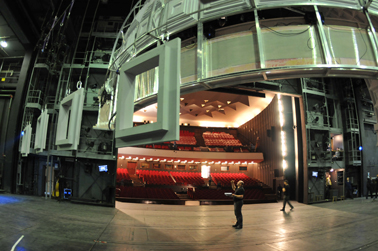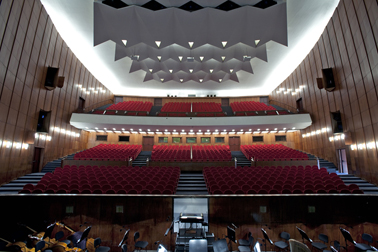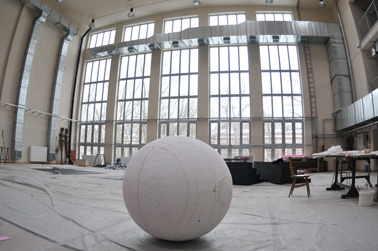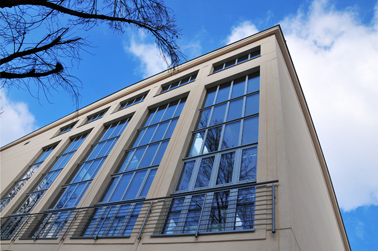Scena to przestrzeń, którą tworzą: scena główna o szerokości 26 m i głębokości 39, 5 m, liczonej wraz z tylną kieszenią – zasceniem oraz dwie kieszenie boczne.
Wyposażona jest w 6 zapadni scenicznych, poruszających się 3 m w górę lub w dół w dowolnej konfiguracji oraz mniejszej zapadni w proscenium.
Na scenę może wjeżdżać 14 wózków o wymiarach 16,5 x 2,7 m z prawej, lewej i tylnej kieszeni. Teatr posiada też scenę obrotową o średnicy 16 m, zawieszoną na ścianie kieszeni tylnej. Rozłożenie sceny obrotowej umożliwia specjalna, ruchoma konstrukcja.
Wszystkie urządzenia napędowe sceny sterowane są elektronicznie.
Nad sceną zamontowanych jest 16 sztankietów o napędzie elektrycznym i 25 sztankietów linowych do podnoszenia i opuszczania elementów dekoracji. W zasceniu funkcjonuje 15 sztankietów o napędzie elektrycznym.
Wysokość sceny wraz z podsceniem, sznurownią i stropem technicznym to 46 m.

fot. Maciej Piąsta
Scena wyposażona jest w nowoczesny park oświetleniowy z 600 reflektorami, zasilanymi przez 450 regulatorów, w tym 150 mobilnych i sterowanych przez system komputerowy za pomocą sygnału DMX i Ethernet. Sprzęt oświetleniowy zamontowany jest w wielu punktach sceny i widowni na specjalnych konstrukcjach oraz na 6 mostach jeżdżących. W systemie pracują też inteligentne urządzenia oświetleniowe typu „ruchoma głowa”, naświetlacze w technologii LED (diodowe) oraz HMI (wyładowcze). Oświetleniowcy dysponują 4 stanowiskami do prowadzenia reflektorów prowadzących, tzw. punktowców.
Nagłośnienie sceny i widowni zapewnia nowoczesny, cyfrowy system dźwięku. Scena jest wyposażona także w projektory video i wielkogabarytowe ekrany do realizacji projekcji wysokiej jakości oraz urządzenia do wykonywania efektów takich jak: śnieg, dymy, bąbelki, konfetti itp.
Fosa orkiestrowa mieści 70 muzyków. Dzięki zamontowanym tam dwóm zapadniom można jej poziom wyrównać z poziomem sceny, powiększając tym samym proscenium. Widownia teatru liczy 1074 miejsca.

fot. Maciej Piąsta
Kubatura budynku głównego i technicznego Teatru Wielkiego w Łodzi wynosi łącznie 195.000 m3. Teatr posiada 2 kurtyny tekstylne i 4 stalowe kurtyny ppoż.
W budynku teatru mieszczą się wszystkie niezbędne pracownie: scenograficzna, stolarska, krawiecka, szewska, modelatorska, perukarska i modniarska. Artyści mogą pracować w czterech dużych salach prób i w kilku mniejszych pokojach pracy indywidualnej.
Nowy budynek techniczny, 2013 rok, fot. Maciej Piąsta

Malarnia w nowym budynku technicznym, 2013 rok, fot. Maciej Piąsta
Idea zbudowania w Łodzi reprezentacyjnego gmachu dla teatru dramatycznego zrodziła się zaraz po II wojnie światowej. W 1948 r. ogłoszono konkurs na projekt takiego obiektu. Projektantami budynku Teatru Narodowego (bo taka była początkowo nazwa) byli: nieżyjący już architekci Witold Korski (wspólnie z ojcem Józefem) oraz Roman Szymborski. Przy projektowaniu współpracowali także wybitni reżyserzy i teatrolodzy: Leon Schiller, Otto Axer i Tadeusz Laskowski. W 1949 r. rozpoczęto budowę, która z przerwami trwała aż 18 lat. W 1954 roku uchwała Prezydium Rady Narodowej m. Łodzi zmieniła – głównie na prośbę nowo powstałej, ale i bezdomnej Opery Łódzkiej – przeznaczenie obiektu na teatr operowy.











